How to become a Special Educator in India: Step by Step Guide in 2025
What is Special Education Needs Course?
Special education is a teaching approach designed for students with unique learning needs. It caters to children with physical, intellectual, emotional, or developmental challenges. The objective of special education is to provide personalized learning experiences that help each student reach their full potential. Special educators design individualized education plans (IEPs), use specialized teaching methods, Online Special Education Needs Course and collaborate with parents and other professionals to ensure holistic development.
Why Choose a Career in Special Education Needs?
A career in special education is rewarding both professionally and personally. Key benefits include:
- High demand: Schools, learning centres, and rehabilitation programs require skilled special educators.
- Impactful work: Help children with learning differences thrive academically and socially.
- Professional growth: Gain expertise in child psychology, curriculum adaptation, and inclusive teaching.
- Flexible career options: Work in schools, NGOs, therapy centres, or online education platforms.
Completing special education courses online equips you with contemporary teaching strategies to meet the needs of 21st-century learners.

Step-by-Step Guide to Becoming a Special Education Needs Teacher
Step 1: Understand Eligibility Criteria
To pursue a career in special education, you typically need:
- Completion of Class 12 for entry-level programs.
- A bachelor’s degree in education, psychology, or related fields for advanced diplomas.
- A passion for working with children and an understanding of diverse learning needs.
Professionals already in teaching or childcare can enhance their skills with special needs education courses to open new career avenues.
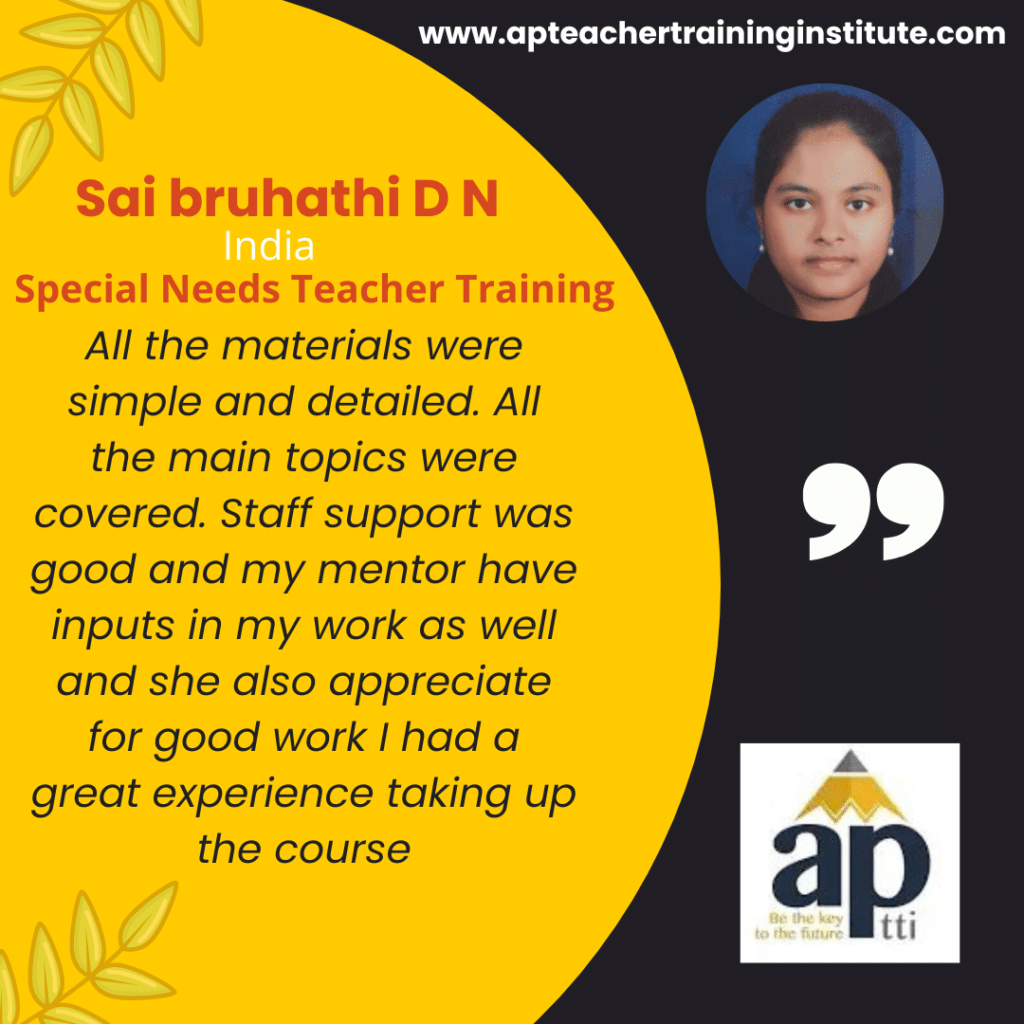
Step 2: Choose the Right Special Education Needs Course
Selecting a suitable course is essential. Options include:
- Online Special Education Courses: Flexible programs that allow learners to study from home while balancing other commitments.
- Diploma Programs: Comprehensive training covering child development, learning disabilities, and teaching strategies.
- Advanced Programs: Specialized courses focusing on areas like autism, speech therapy, or behavioural interventions.
For more guidance on course selection, explore AP Teacher Training Institute.
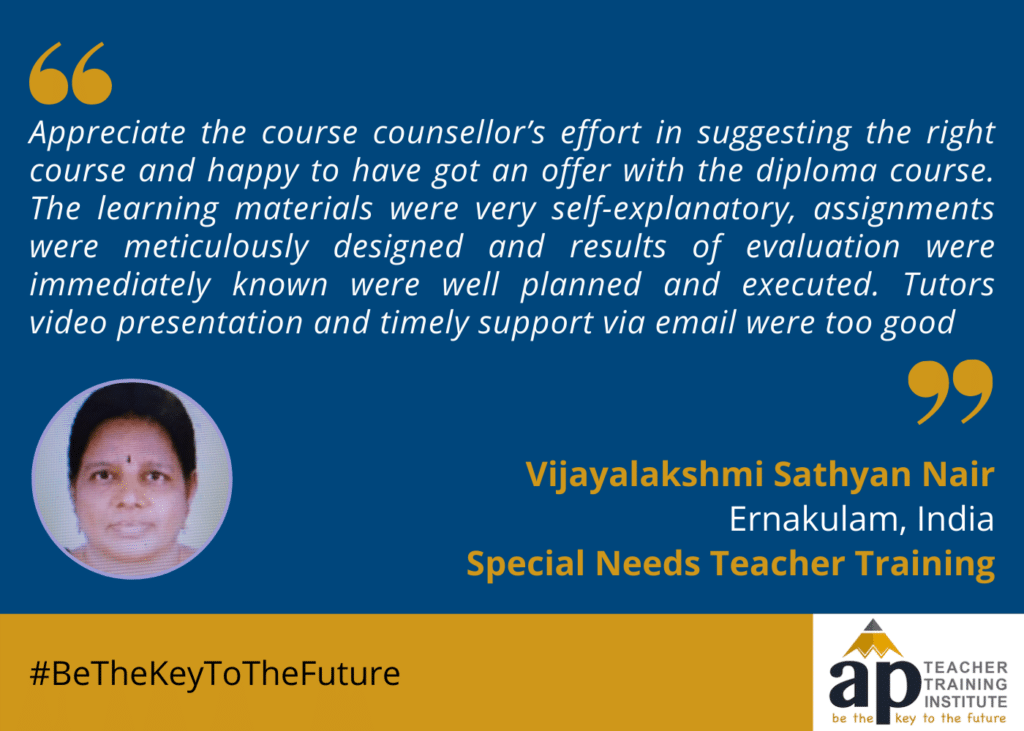
Step 3: Complete Your Special Education Needs Certification
Upon enrolling, the course will typically cover:
- Understanding diverse learning needs.
- Teaching strategies for children with intellectual or developmental challenges.
- Behaviour management and communication skills.
- Developing Individualized Education Plans (IEPs).
Completing special education diplomas provides both theoretical knowledge and practical skills required to work effectively with students.
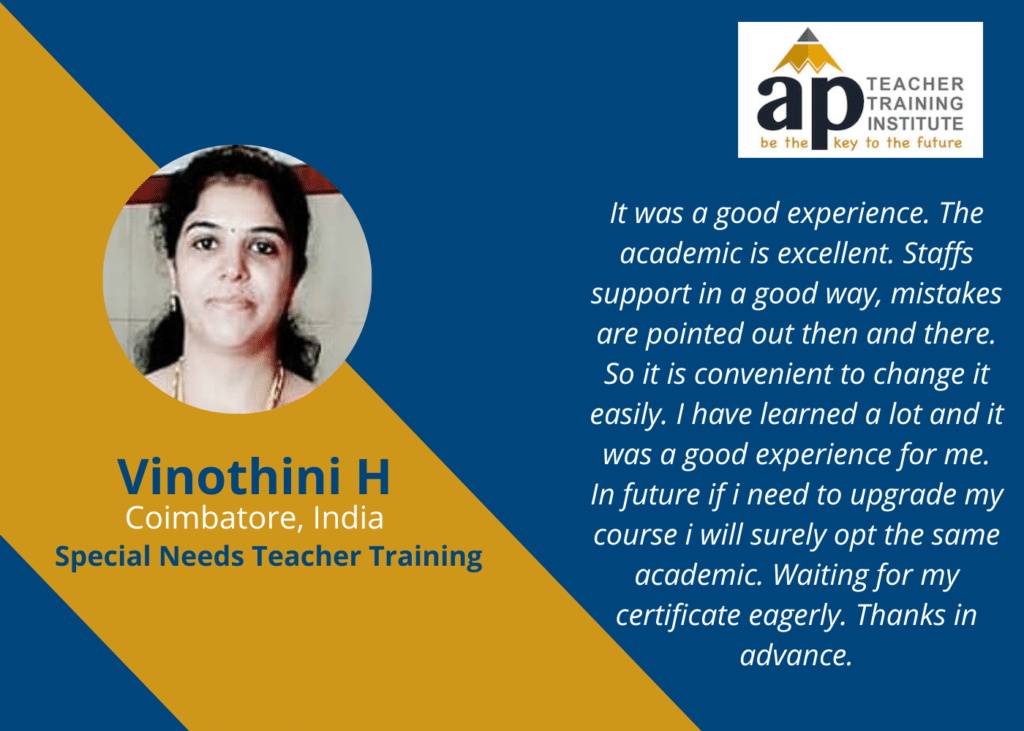
Step 4: Gain Practical Experience in Special Education Needs
Hands-on experience is vital for building confidence and effectiveness as a special educator. Opportunities include:
- Internships or teaching practice in schools or special education centres.
- Volunteering at NGOs or community programs for children with special needs.
- Online teaching and therapy sessions for virtual experience.
Practical training ensures that you can apply your learning in real-world settings and develop essential teaching competencies.
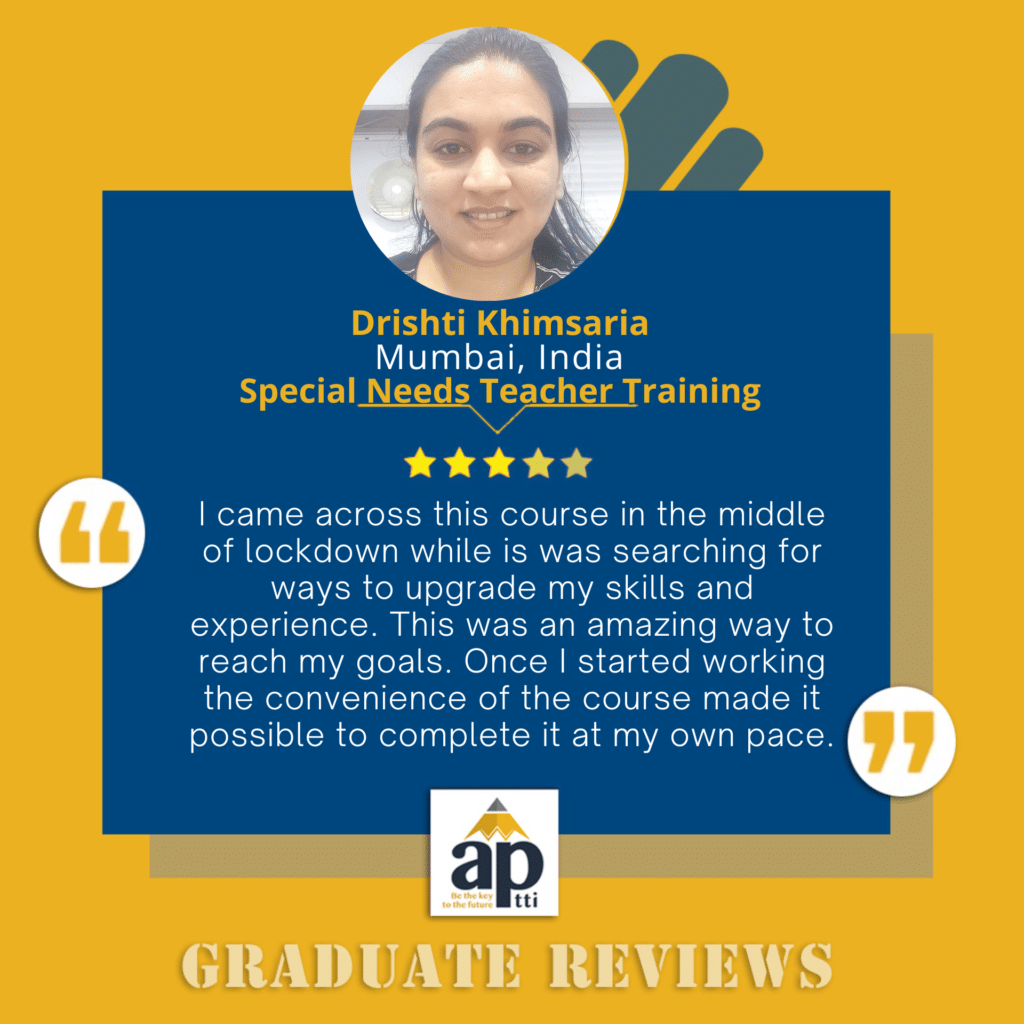
Step 5: Apply for Jobs
Once certified, you can explore career opportunities in various settings:
- Inclusive schools and preschools.
- Special education centres and therapy programs.
- NGOs working with children with disabilities.
- Online teaching platforms and remote learning programs.
Tailor your CV to emphasize your special education diplomas, practical experience, and specialized skills. For placement support and career advice, visit AP Teacher Training Institute.
Spcial Education Course Options in India
India offers diverse programs to cater to aspiring special educators:
- 120-Hour Online Special Education Courses – Self-paced, ideal for beginners and working professionals.
- Advanced 150–300 Hour Special Education Diplomas – Comprehensive programs covering multiple teaching strategies and specialized interventions.
- In-Class Programs – Mentorship and live practical sessions with hands-on experience.
- Internship-Integrated Programs – Combines theoretical certification with practical teaching exposure.
Choosing the right program depends on your learning preferences, career goals, and availability.
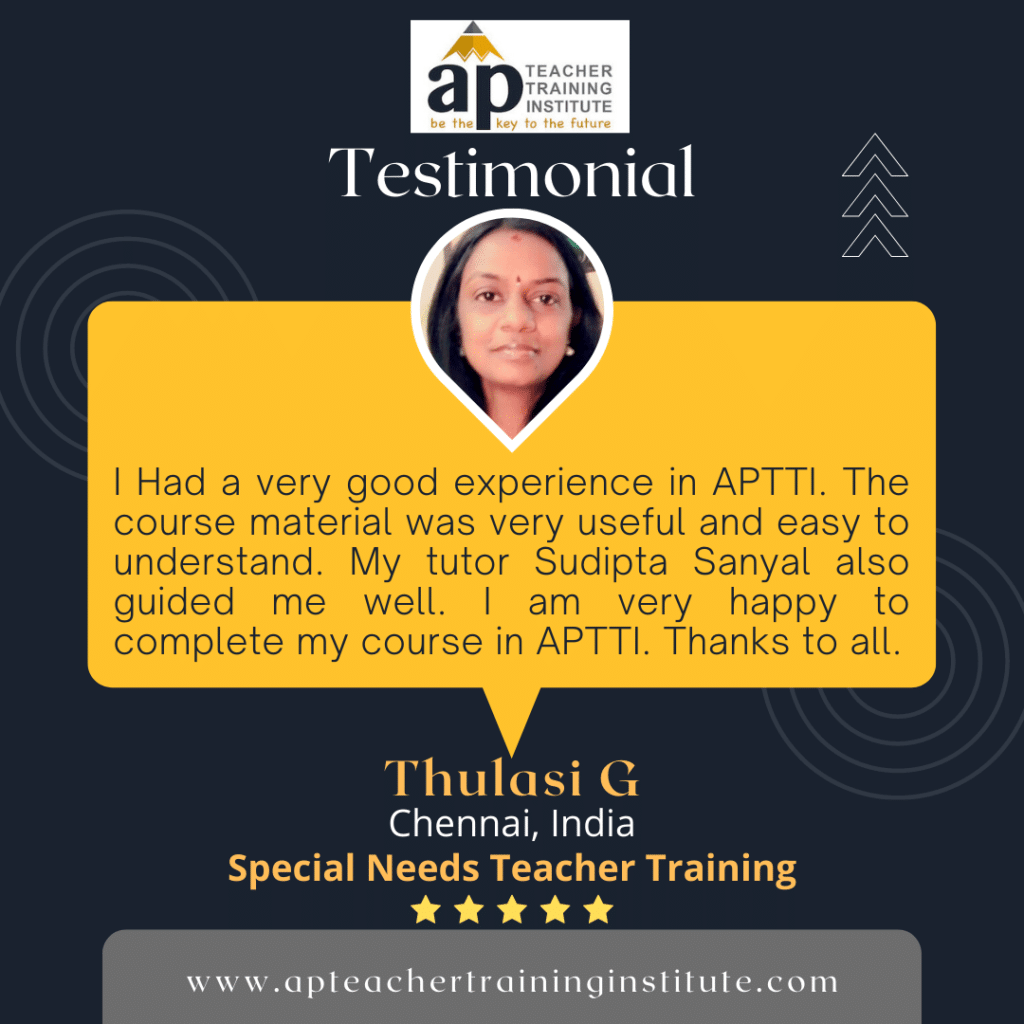
Frequently Asked Questions (FAQs)
Q1: Can I become a special educator without a degree?
Entry-level programs may accept candidates with Class 12 qualifications, but advanced diplomas typically require a bachelor’s degree.
Q2: Are online special education courses effective?
Yes. Special education courses online are designed with interactive content, practical assignments, and virtual guidance to ensure effective learning.
Q3: What career opportunities exist for certified special educators?
Certified special educators can work in schools, therapy centers, NGOs, rehabilitation programs, or as online tutors.
Q4: How long does it take to complete a special education diploma?
Depending on the program, diplomas may range from a few months to one year. Online courses provide flexibility to study at your own pace.
Q5: Can I specialize in specific needs like autism or speech therapy?
Yes. Many special needs education courses allow you to specialize in areas such as autism, behavioural therapy, or learning disabilities.
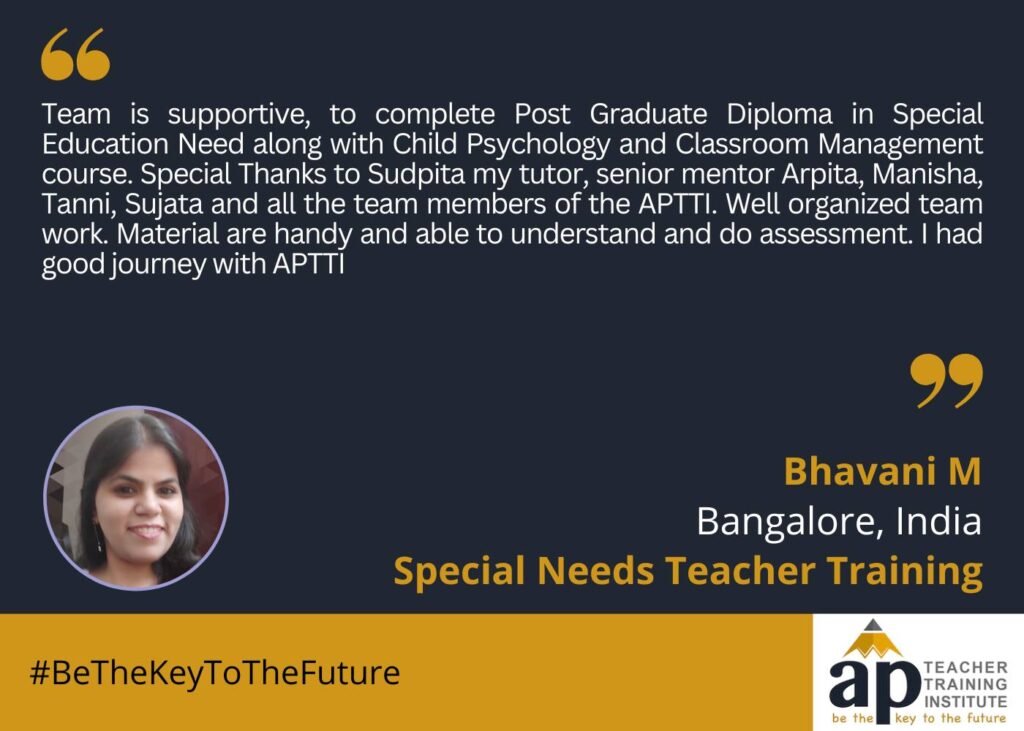
Call to Action (CTA)
Ready to start your journey as a special educator? Explore accredited special education courses online and gain the knowledge and skills to make a meaningful impact. Visit AP Teacher Training Institute today to enroll and begin your career in special education


